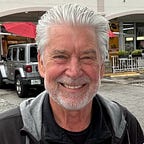The Duplicitous Nature of Politics
“If you don’t stand for something, you will fall for anything.” — Alexander Hamilton
I will forever remember the call from Washington, D.C., just days after I graduated from Brigham Young University in 1980. “We would like you to join our team as press secretary to republican Congressman Dan Marriott,” said John Hanks, chief of staff. John, a good-natured former television reporter, had previously been Marriott’s press secretary. He wanted his successor to be young and teachable.
Growing up in northern California, the son of a conservative dairy farmer, I was a purebred Reagan republican. I first met Ronald Reagan in 1968 when my father took me to one of the California Governor’s early presidential campaign events near our farm at Lake Redding Park in Redding, CA. At the tender age of 13, I was enthralled with the authenticity of this charismatic visionary, who shared a populist message that rang true, even to a young teenager like me — ‘We will decentralize government and give more power to people to make your lives better.’
That campaign was the first of four attempts Reagan made before finally being elected in 1980. His message remained the same always. I respected him for standing by his principles, never wavering in his beliefs.
Just over a decade later, and about a month after Reagan’s victory, I received the call inviting me to join the republican representative of Utah’s Second Congressional District as his spokesman and press advisor. Ronald Reagan was to become the fortieth president of the United States, defying conventional wisdom and the pollsters of the day, and I was given an opportunity to participate in making history.
My first week in Washington I attended Reagan’s swearing in on the west side of the Capitol, albeit from half a football field away. Emboldened by other Marriott staffers, we even snuck into one of the inaugural balls that night, and later trolled appointees and other VIPs getting autographs and shaking hands. A week later I witnessed the former Iranian hostages, freed just minutes after Reagan was sworn in as president, as they were bused down Pennsylvania Avenue on their way to meet the new president in the White House. It was a heady time.
Those were golden years. I was young, fresh, and a political virgin. My boss, Congressman Marriott, whose instincts and political skills won him a seat in Congress four years before I was hired, represented the republican minority in the House. He soon rose to become Minority Leader on the Interior and Insular Affairs Committee, a powerful position second to the legendary (and former presidential candidate) Morris Udall.
A political novice, Dan Marriott was an anomaly in Utah politics. A Million Dollar Round Table insurance salesman, he won Utah’s Second Congressional District seat, defeating the Democrat incumbent Allan Howe. Credit Dan with good timing and remarkable intuition, Howe orchestrated his own destruction when he was arrested for soliciting a prostitute in Salt Lake City just a few months before the election. Marriott was overwhelmingly elected to Congress in the wake of this controversy.
Although he was a tough boss, I admired Dan and shared his political perspective on most issues. I believed his views were driven by deep conviction and principle, like my political hero President Reagan.
My task as press secretary, was to understand and articulate the Congressman’s views on a range of issues — a proposed nuclear arms freeze, the prospect of Utah becoming the site for a nuclear waste repository, education, unemployment, taxes, abortion, etc. Perhaps my most difficult task was writing the Congressman’s quarterly newsletter, sent to 500,000 residents of the Second District. The printing press was scheduled weeks in advance, so deadlines were inflexible, meaning I often worked around the clock to complete issues on time.
My experience writing the July 1982 issue shattered my political naivety forever. The results of the 1980 census gave Utah a third congressional seat, meaning a change of boundaries for the Second District, which had previously included a small slice of Salt Lake City and most of ultra conservative southern Utah. Redistricting took away southern Utah and gave us most of Salt Lake City, a much more liberal enclave. We polled our new constituents to gauge their views on the issues of the day.
I worked through the night on this particular issue, going home for a few hours of sleep as the sun began to peek above the horizon. I was satisfied with the product of my work, which I laid on the congressman’s chair for final approval. I had become adept at writing in his voice and I was confident it accurately reflected his views.
As I returned later that morning, the newsletter draft was on my desk, torn in half, with a note from Dan, “Let’s talk.”
He was visibly angry as I poked my head in the door of his spacious office. “Did you read the survey results?” he asked. “Do you want to see me defeated in the next election?”
My innocence was shattered. I realized for the first time that congressmen, who face re-election every two years, have little motivation to stand by principle. To remain in office they must stick a finger in the air to see which way the wind is blowing. This is a dilemma faced by every elected official.
My view of politics and politicians changed that day. I’m more dubious and less trusting. Perhaps this is why people have so little respect for politicians. We are on to them. We know most of them will say whatever it takes to get elected.
Ronald Reagan was an exception. He had the courage to stand for what he believed. As we enter the new year, I am hopeful the Trump Administration is cut from this same mold.
